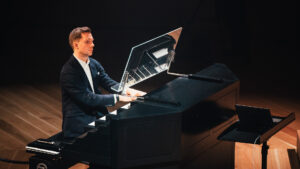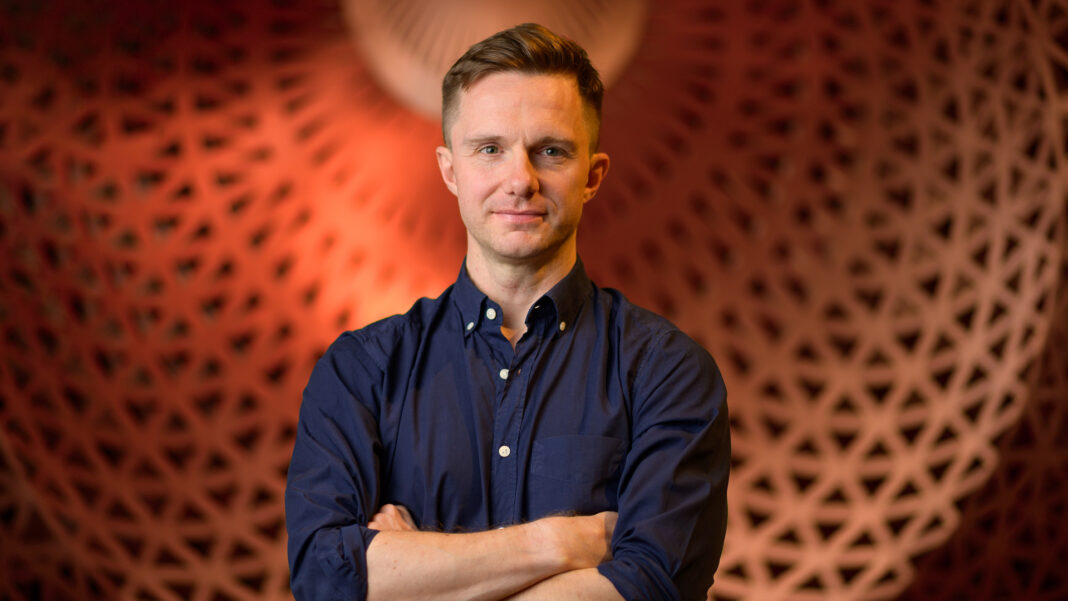The California Festival, a series of concerts amongst performing arts organizations throughout the state, will offer audiences three unique opportunities to hear organist/pianist James McVinnie.

On Sunday, November 12th, McVinnie will perform a recital on both the organ at Walt Disney Concert Hall and the piano. That concert will feature works by Johann Sebastian Bach, inti Figgis-Vizueta, Philip Glass, Meredith Monk, Nico Muhly and Gabriella Smith.
On Tuesday, November 14th, McVinnie will give the world premiere performance of Samuel Adams’ Eden Interstates as part of the LA Phil’s Green Umbrella series. This concert is also at Walt Disney Concert Hall.
On Friday, November 17th and Saturday, November 18th, he joins the San Francisco Symphony where he will perform Smith’s Breathing Forests. Esa-Pekka Salonen conducts those concerts.
With an upcoming repertoire that covers over three centuries of music, McVinnie and I had plenty to talk about when we spoke on Halloween. What follows are excerpts from our conversation that have been edited for length and clarity. To see the full interview with McVinnie, please go to our YouTube channel.
Q: Robert Schumann is quoted as having said about the organ, “No other instrument takes such an immediate revenge on sloppiness in composition and playing.” As a performer, how do you determine what music won’t allow sloppiness from you and does not represent sloppiness from a composer?
The organ had its zenith in the 17th and 18th centuries when music was all about counterpoint. That was the high point of that style of music making and there’s a kind of utopian ideal to counterpoint that always appealed to me. You have music made up of voices and the music works on these horizontal axes and the voices interact to create the piece of music, and there’s absolute equality of importance. You could play a Bach figure, for instance, and you take out one note and the whole artifice of the expedition falls apart. The organ’s an ideal instrument for counterpoint. You have this incredibly uniform quality to the sound across the range so you can hear every voice as clearly as the other.
That’s the compositional side. From the playing side there’s really nowhere to hide on the organ. Even if you think acoustics will cover you up, you’re perhaps on the wrong track there.
These concerts that you’re doing with both the Los Angeles Philharmonic and with the San Francisco Symphony are a part of the California Festival, which is showcasing works by composers primarily written within the last five years. How do you know if most of the recent compositions that would qualify for inclusion in this festival – whether or not they are being performed by you or anyone else – represent the future you would like to see in contemporary classical music?
The composer whose work I’ve loved getting to know most recently is Gabriella Smith. Her music has this incredible immediacy to it. Her music hits a very deep note in how I think about what music should be and how immediate and how accessible music should be to everyone.
Her work is predominantly preoccupied with the climate crisis. Humanity and the arts have been going hand-in-hand since the year dot. Gabriella has always been very keen that her music is a call to arms, really, and a way of making these issues that we’re faced with very prescient and very immediate.
This organ concerto I’m playing, Breathing Forests, is about the life cycle of a forest. It’s in three contiguous movements. Grow, Breathe and Burn are the three movement’s names. It’s about the natural lifecycle of the forest and forest fire is a natural part of what happens. This is a commentary on when fire becomes an unnatural part. I can think of no better way than to ignite imagination in listener and performer alike.
You gave the world premiere in February a year ago with the Los Angeles Philharmonic. The climate crisis has gotten worse since then. As somebody who cares about the environment and who cares about music, how has your relationship to this particular piece and its message changed since you gave that first performance?
It’s just much more immediate. I’m sitting here in Devon, England, and there’s a storm happening outside. September was the hottest on record. I mean, it really is changing month by month. I’m 40. I don’t have kids. But, I fear for the kids that I see around and what kind of experiences they will have to endure as they grow older. It is something that I feel is growing in proportion in people’s general consciousness over here. Of course, that will be the case in the States as well. So it’s very urgent.
You’re going to be doing Imaginary Pancake by Gabriella Smith in Los Angeles, which is a piano work that was commissioned for Timo Andres. Unless people are at both concerts, they aren’t going to know if there’s a conversation that happens between those two works. From a performer’s perspective, is there a dialog that you can see between the solo work of Imaginary Pancake and the robust relationship that the organ has with the orchestra in Breathing Forests?
One of the interesting things about music is that there are often seemingly simple cycles and progressions that repeat over time, which I guess has been the way most music has been put together. But her version is incredibly vital. That’s one of the reasons why I think the music is incredibly approachable from a layperson’s perspective. There are these moments in Imaginary Pancake that use exactly the same kind of grammar and the same kind of language. So yeah, definitely they’re kind of companion pieces. But that’s true of a lot of her music.
How important is it for you as a listener, or for you as an artist, that the music being composed today has that approachability?
It is important. You can have in MoMA a CRU modernist chair that’s beautiful to look at, but not terribly comfortable to sit on. We’ve gotten to the point in music where we can have an approachability and an intellectual element to it that can sit by, for want of a better kind of terminology, a prettiness to the music. Nico Muhly’s music does all of those things. It’s very beautiful music to listen to, but it’s acutely complex as well. Gabriela’s music as well. We have to remember as classical musicians that most people on the street say their idea of music is so different from mine or yours. Not that we should ever dumb ourselves down, but you have to give people a way in.
The first of your two concerts in Los Angeles is a recital where you’re going to be playing both the monster organ that is at Walt Disney Concert Hall and the piano. What’s the conversation that you want to create between the music that you choose to play on each instrument?
What I have done in putting together this program is the music has the most important thread through the recital and have a sequence in program of music, irrespective of the instrument that I’m playing on. I’m actually playing an organ piece on the piano and I’m playing a piano piece by Meredith Monk on the organ. So I want to play around with this idea of what we think of as being the idealized instruments for the music.
In the second half, I’m playing music entirely by Philip Glass. There I’m using the organ rather like a synthesizer. I’m playing Music in Fifths, which is a piece that dates from the 1960s that he wrote for his ensemble. It’s possible to play that piece of music as a soloist on the organ, but use the organ in a way which is a nod to the sound of that very austere world. There are lots of ways of circumnavigating people’s expectations, which I try to do with my programing and the instruments that I play.
I like Counterpoint, the album you released where you went back and forth between Glass and Bach, because I thought that it was easy to see a throughline between the two of them.
Definitely. Philip’s music has the same kind of economy I was talking about at the beginning about counterpoint. I called the record Counterpoint for that reason. If you take one of the tunes on the piano by Glass and you take one note away, it’s the same kind of effect that the artifice of the music completely disintegrates. It has a real integrity to it. I chose for that recording movements from Art of Fugue and the C Minor Prelude and Fugue. It’s that kind of intensity to that music and that immediacy and austerity, for want of a better way of describing that music, which is shared by lots of this music from the 1960s by Glass as well.
In a 2021 column for the New York Times, you were asked about the five minutes that will make you love the organ. You said, “Bach is the ultimate composer for this extraordinary, timeless instrument.” If you were to posit who, amongst composers writing for the organ today, is at the top of their game, who would you say it would be and why?
Nico Muhly’s music for the organ is incredibly natural. He understands how the organ works. It’s been very interesting working with other composers who are perhaps less familiar with the way in which you write in the compass of the instrument and the registration of possibilities.
The other people that I work with…Tom Jenkinson is on the other end of the spectrum. He’s an amazing musician who works and releases music under the name of Squarepusher. So if you’re into nineties electronic music, he’s absolutely a cult household name. Cecilia McDowall over here is a wonderful composer for the organ. I admire her music hugely. There’s Judith Bingham who has a huge catalog for the organ, a slightly different musical ecosystem to the one I work in. Her music is very well worth checking out. And then, of course, there are a few pieces by Arvo Pärt’s that I love playing.
French organist composer Charles-Marie Widor is quoted as having said, “Organ playing is the manifestation of a will filled with the vision of eternity.” How would you define your will when you are sitting at the organ bench and what visions do you have while you’re playing about what eternity might be?
Wow, what a question. It sounds like Widor’s talking about his religious faith. I don’t know whether he was, but I think it’s safe to assume that he was a religious man. Most organists in the 19th century were. I like liturgy and I like church music. Where I stand on the spectrum of faith is a complex issue. I guess the only thing I can say is the organ is definitely the most transcendental instrument that you could possibly play – whether you’re in a cathedral or in a concert hall or a tiny room playing to your friends on a two-stop chamber organ. To those who have religious faith, obviously it has huge implications. For those who don’t, it’s still an extraordinary instrument that goes to the very heart of who I am as feeling as I could have a vocation to do what I do. It’s a wonderful thing.
To see the full interview with James McVinnie, please go here.
Main Photo: James McVinnie (Photo by Graham Lacadao/Courtesy Los Angeles Philharmonic)










